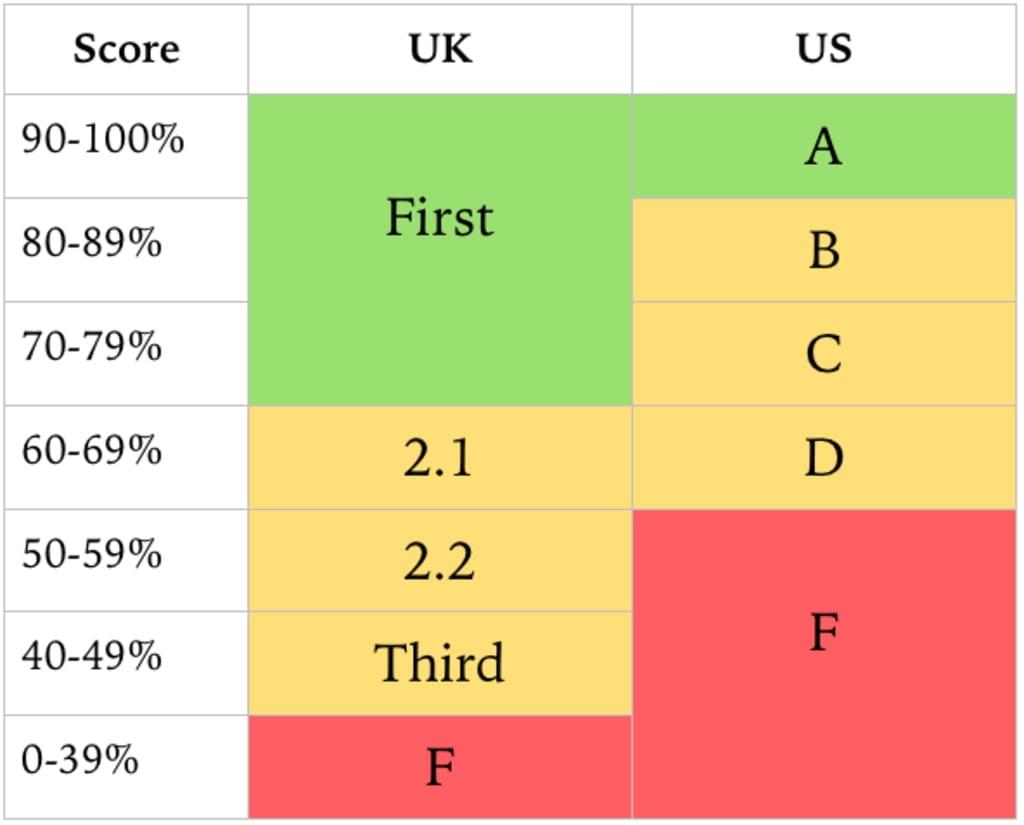Understanding the UK University Grading System
A Closer Look at Grading Classifications

In the United Kingdom, the university grading system plays a pivotal role in determining students' academic achievements and future prospects. Understanding this system is essential for students to navigate their educational journey effectively. This article provides an overview of the UK university grading system, including its classifications and criteria.
Grades and Classifications
First-Class Honours (1st)
First-class honours, commonly denoted as "1st," represent the highest level of academic achievement in the UK. Students awarded this classification demonstrate exceptional understanding and mastery of their subjects. Typically, a first-class degree requires a percentage of 70% or above. Achieving a first-class honours degree opens doors to various opportunities, including postgraduate studies and prestigious career paths.
Upper Second-Class Honours (2:1)
A 2:1 degree, also known as an upper second-class honours, is a strong academic achievement. This classification signifies a solid understanding of the subject matter, with grade boundaries usually ranging between 60% and 69%. While not as prestigious as a first-class honours, a 2:1 degree is highly regarded by employers and academic institutions alike. Many graduate schemes and further education programs require a 2:1 or higher for admission.
Lower Second-Class Honours (2:2)
A lower second-class honours, or 2:2, is awarded to students who have demonstrated a satisfactory level of understanding in their studies. Grade boundaries for this classification generally fall between 50% and 59%. While a 2:2 degree may not carry the same level of prestige as higher classifications, it still demonstrates a solid grasp of the subject matter and can lead to rewarding career opportunities in various fields.
Third-Class Honours (3rd)
A third-class honours, or 3rd, is awarded to students who have met the minimum requirements for a degree but have not demonstrated a high level of academic achievement. Grade boundaries typically range from 40% to 49%. While a third-class honours degree may present some challenges in terms of securing employment or further education opportunities, many graduates successfully leverage their skills and experiences to build successful careers.
Ordinary Degree
An ordinary degree is awarded to students who have completed their course requirements but have not achieved the standard for honours. This classification is often awarded when students fail to meet the criteria for a higher classification. While an ordinary degree may not carry the same level of recognition as an honours degree, it still demonstrates the completion of a rigorous academic program and can be valuable in certain career paths.
Pass Degree
A pass degree signifies that a student has completed their course requirements but has not achieved the standard for an honours degree. This classification may also be awarded when students choose to exit their course before completing the full requirements for an honours degree. While a pass degree may not be as prestigious as an honours degree, it still represents a significant accomplishment and demonstrates the acquisition of valuable knowledge and skills.
Grading Criteria
Academic Performance
Grades in the UK are primarily based on academic performance, including performance in coursework, exams, dissertations, and other assessments. Students are expected to demonstrate a thorough understanding of the subject matter and the ability to apply their knowledge effectively in various contexts. Assessors evaluate students' work based on the quality of their analysis, argumentation, and critical thinking skills.
Coursework and Exams
The grading system considers the balance between coursework and exam results, with some courses placing more emphasis on continuous assessment through coursework. Coursework assignments may include essays, reports, presentations, and practical projects, allowing students to demonstrate their understanding of the material and their ability to apply it in real-world scenarios. Exams, on the other hand, assess students' knowledge and understanding of the subject matter within a controlled time frame.
Dissertation or Final Project
For many degrees, the dissertation or final project carries significant weight in determining the overall grade. Students are required to conduct independent research on a topic of their choice, demonstrating their ability to formulate research questions, gather relevant data, analyze findings, and draw meaningful conclusions. The dissertation allows students to showcase their academic abilities and explore areas of interest in greater depth.
Class Participation
Active participation in classes and seminars may also contribute to a student's overall grade, reflecting their engagement and contribution to academic discussions. Class participation encourages students to share their perspectives, ask questions, and engage with course material in a meaningful way. Assessors consider the quality of students' contributions, their preparedness for class discussions, and their ability to interact constructively with peers and instructors.
Extra-Curricular Activities
While not directly related to academic performance, involvement in extracurricular activities can enhance a student's overall profile and may be considered in the grading process. Extracurricular activities, such as student clubs, societies, volunteer work, internships, and part-time jobs, provide students with valuable experiences and skills that complement their academic studies. Assessors may look favorably upon students who demonstrate a commitment to personal and professional development outside of the classroom.
Looking for Guidance on Your Assessment help?
If you're looking for guidance on your Assessment help, you're in the right place! Our team is here to provide support and assistance with all aspects of your academic tasks. Whether you need help understanding grading criteria, improving your coursework, or preparing for exams, we're here to help you succeed. Reach out to us today for personalized guidance and support tailored to your needs
Challenges and Considerations
Subjectivity in Grading
Grading can be subjective, with different assessors having varying interpretations of academic work. However, measures are in place to ensure fairness and consistency in the grading process. Universities provide training and guidance to assessors to minimize bias and uphold academic standards. Additionally, assessment criteria are often clearly defined, allowing students to understand what is expected of them and how their work will be evaluated.
External Factors
External circumstances, such as personal challenges or health issues, can impact a student's academic performance. Support systems are available to help students facing such challenges, including academic advisors, counselors, and disability services. Universities may offer extensions, accommodations, or other forms of support to students experiencing difficulties that affect their studies. It's essential for students to communicate with their instructors and seek assistance when needed to ensure they receive the support they require.
Cultural Differences
International students may encounter differences in grading practices due to cultural differences. In some cultures, academic achievement is primarily assessed through exams, while in others, continuous assessment through coursework is more common. Universities often provide support and guidance to help international students navigate the UK grading system, including orientation programs, academic workshops, and peer mentoring initiatives. It's important for international students to familiarize themselves with the grading criteria and expectations specific to their course of study and seek assistance if they have any questions or concerns.
GPA Conversion
For students considering opportunities abroad, understanding how UK grades translate into GPA (Grade Point Average) is crucial. Conversion tables are available to assist in this process, allowing students to compare their UK grades to GPA equivalents used in other countries. Many universities and employers require GPA information for admission or employment purposes, especially for international students applying to study or work abroad. It's essential for students to accurately convert their grades to GPA to ensure they meet the requirements of their desired educational institutions or employers.
Conclusion
Understanding the UK university grading system is essential for students embarking on their higher education journey. By familiarizing themselves with the different classifications and grading criteria, students can navigate their studies more effectively and make informed decisions about their academic and career paths.
About the Creator
Marry Smith
Looking For Pay Someone To Do My Assignment UK ? We can help! We offer a wide range of services, including writing, editing, and proofreading. We'll work with you to understand your needs and deliver a product that meets your expectations.
Enjoyed the story? Support the Creator.
Subscribe for free to receive all their stories in your feed. You could also pledge your support or give them a one-off tip, letting them know you appreciate their work.






Comments
There are no comments for this story
Be the first to respond and start the conversation.